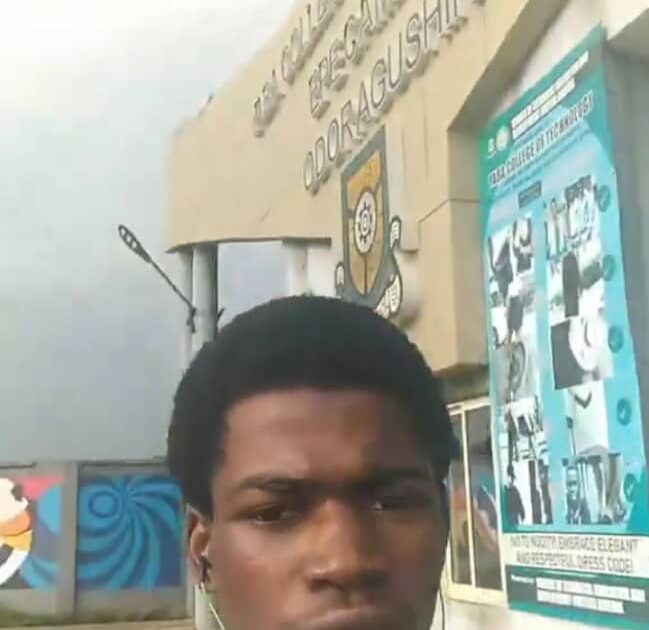This incident at Yaba College of Technology highlights the complexities of enforcing dress codes in educational institutions, particularly when they intersect with individual expression and security concerns. A former student of the college found himself barred from entering the Epe campus due to his hairstyle, described as an Afro, sparking a debate about the appropriateness of such restrictions and the manner in which they were enforced. The student, frustrated by the week-long denial of access, argued that his hairstyle was not significantly different from other students allowed entry and emphasized the financial implications of being prevented from attending to a business matter worth N2 million within the campus. His attempts to reason with the security personnel were met with resistance, with guards citing instructions from the college management as justification for their actions. The student’s recording of the encounter further complicated the situation, leading the college to question his motives and portray him as a potential security threat.
The college’s public relations officer offered a contrasting perspective on the incident. He stated that the former student’s inability to clearly articulate his purpose for visiting the campus raised security concerns. According to the PRO, established business operators on campus are typically recognized by staff and security, and their access is generally unhindered. The former student’s failure to provide a satisfactory explanation for his presence, coupled with his claim of a N2 million business venture that remained unidentified by security, triggered suspicion. This, according to the college representative, led to the decision to deny him entry. The PRO questioned the former student’s decision to record the incident, suggesting it was a mischievous act unbecoming of a “good ambassador” of the institution.
This incident throws into sharp relief the inherent tension between institutional regulations and individual freedoms. The college, emphasizing its responsibility to maintain order and security, justifies its strict enforcement of dress codes and its scrutiny of individuals entering its premises. From this perspective, the former student’s inability to provide a clear and verifiable reason for his presence, coupled with his hairstyle deemed in violation of the dress code, constituted sufficient grounds for denying him entry. The college’s focus on maintaining a secure environment and preventing potential disruptions underscores the importance they place on upholding established rules and procedures.
Conversely, the former student’s perspective highlights the potential for such regulations to be applied arbitrarily and to infringe upon personal expression. His argument that other students with similar hairstyles were granted access suggests a lack of consistency in the application of the dress code. Moreover, the financial impact of being barred from attending to his business on campus adds another layer to the issue, raising concerns about the proportionality of the response to the perceived infraction. The student’s resort to recording the incident can be interpreted as an attempt to document what he perceived as unfair treatment and to hold the institution accountable for its actions.
The conflicting narratives underscore the need for clear communication and transparent enforcement procedures regarding dress codes and campus access. The college’s emphasis on the availability of the dress code in student handbooks and on displayed signage suggests an attempt to ensure that the regulations are readily accessible. However, the incident highlights the potential for discrepancies between written policy and actual practice. The security personnel’s reliance on verbal instructions from management rather than a documented policy raises questions about the clarity and consistency of the enforcement process. Improving communication and ensuring that security personnel are adequately trained on the nuances of the dress code could help prevent similar incidents in the future.
Furthermore, the incident underscores the importance of establishing clear protocols for handling security concerns while respecting individual rights. While the college’s concern for security is understandable, particularly in the current climate, it’s crucial to ensure that security measures are implemented in a manner that is fair, consistent, and respects individual freedoms. Developing mechanisms for individuals to challenge decisions they perceive as unfair or discriminatory is essential for maintaining a just and equitable campus environment. This could include establishing a clear appeals process for students and visitors who believe they have been wrongly denied entry.
In conclusion, the incident at Yaba College of Technology serves as a case study in the complexities of balancing institutional regulations with individual rights. While the college’s focus on maintaining a safe and orderly environment is legitimate, the incident highlights the potential for dress code enforcement to be perceived as arbitrary and discriminatory. Improving communication, ensuring consistent application of the dress code, and establishing clear procedures for addressing security concerns while respecting individual rights are crucial steps towards creating a more inclusive and equitable campus environment. The incident also raises broader questions about the role of dress codes in educational institutions and the extent to which they should be allowed to restrict individual expression. A continued dialogue between students, faculty, and administrators is essential to finding solutions that respect both individual freedoms and the institution’s need to maintain order and security.


